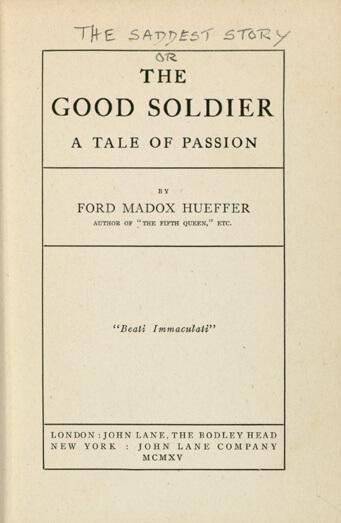The Good Soldier
by Ford Madox Ford
Though the accompanying frontispiece image for The Good Soldier is rather plain compared to all the others I have had the honor to republish at this site, it is by far my personal favorite (so far, anyways). I appreciate the behind-the-scenes battle hinted at in the hand-written title: "The Saddest Story." The novel was published in 1915 after the onset of World War I. Ford had suggested the title "The Saddest Story." When his publisher asked for alternatives, he jestingly and sarcastically suggested "The Good Soldier." Unfortunately, business proclivities being what they are, the publisher knew that "war" stories were selling well so that title was selected. As a later compromise, the full title was amended with a subtitle to hint at the stories true nature, "The Good Soldier, A Tale of Passion." Ford changed his last name from "Hueffer" in 1919, after the book was published.
The Good Soldier is routinely cited as one of the great works of 20th century English literature and routinely finds its way onto selections like the Modern Library's 100 Best English-Language Novels of the 20th Century where it was ranked 30th in their 1998 survey of their editorial board. It's also a fine example of The Unreliable Narrator.
The story itself follows two [note the quotes] "perfect couples" and features John Dowell acting as an unreliable narrator. The story also uses a series of non-sequential flashbacks, which was a literary technique pioneered by Ford.
Here is the cast of characters as presented by Wikipedia . . .
John Dowell: The narrator, husband to Florence. Dowell is an American Quaker, a gullible and passionless man who cannot read the emotions of the people around him.
Florence Dowell: John Dowell’s wife and a scheming, manipulative, unfaithful woman who uses Dowell for his money while pursuing her affairs on the side. She fakes a heart ailment to get what she wants out of her husband and has a lengthy affair with Edward Ashburnham.
Edward Ashburnham: Friend of the Dowells and husband of Leonora. Ashburnham is a hopeless romantic who keeps falling in love with the women he meets; he is at Nauheim for the treatment of a heart problem but it’s unclear whether the ailment is real. He is Dowell’s opposite, a virile, physical, passionate man.
Leonora Ashburnham: Edward’s wife by a marriage that was more or less arranged by their fathers. Leonora comes to resent Edward’s philandering as much for its effect on her life as on her marriage and asserts more and more control over Edward until he dies.
Nancy Rufford: The young ward of the Ashburnhams; Edward falls in love with Nancy after he tires of Florence. Eventually Nancy is sent by Ashburnham to India to live with her father, but she goes mad en route when she learns of Edward’s death.
La Dolciquita: A Spanish dancer (The Grand Duke's mistress) who is Edward's first sexual affair. Although he believes himself to be romantically attached to her, he quickly becomes disillusioned by her thirst for his money. She is not at all interested in Edward's "sentimental" gestures, and asks for money and expensive gifts in exchange for sex.
Maisie Maidan: Edward's third affair. Maisie was a young, pretty, married woman whom Leonora purchases from her "child husband" and brings back to Europe for Edward's sake. Maisie has a true heart defect and it takes her life as she tries to flee from Edward.
Featured in our collection of World War I Literature
Return to the Ford Madox Ford library.
